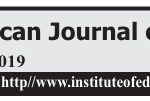
West African Journal of Education
II Vol. XXXIX 2019
Psycho-social Factors and Creativity of Undergraduates in South-West Nigeria
Introduction
Researchers have continuously underscored the importance of creativity in human
growth and development. Puccio (2012) described creativity in human growth and
development as an essential life skill.One can, therefore, assert that creative living is away
oflifewhose purpose isliving a deeper and richerlife (Puccio,Mance,Switalski andReali,
2012). If creativity is a way of life, it becomes necessary to promote it. Understanding and promoting creative living is a function of a number of factors which researchers and
practitioners of creativity have grappled with since the beginning of research into the
phenomenon of creativity. In spite of the groundbreaking successesrecorded in the global
creativity literature, Nigeria cannot qualify as a country that has truly made creativity a
deliberate part of her existence (Obialo, 2017a). This lack of the promotion of deliberate
creativity in Nigeria has brought more challengesfor Nigerian creativity researchers who
have to (...)
Evaluation of the Undergraduate Chemistry Education Programme in Universities in Rivers State, Nigeria
Introduction
Chemistry is a natural and physical science subject that has a wide application in almost
all spheres of human endeavours. The role of chemistry and chemistry education in
human capacity development through education, especially science, technology, engineering and mathematics (STEM), is a well-established locally and internationally
(Olson and Riordan, 2012; Hassan, 2016; Eagan, Stolzenberg, Zimmerman, Aragon,
Sayson and Rios-Aguilar, 2017; Hazari et al, 2017; Shamsuddin, Arome, Aminu, Isah
and Adamu (2017). For several years, there has been considerable national attention
given to increasing the talent pool in STEM to address the growing concerns of
sustainability in the global economy, (...) Continue
Psychological Factors as Predictors of Senior Secondary Students’ Attitude toward Environmental Concepts in Biology in Lagos, Nigeria
Introduction
Biology is the natural science that is concerned with life and living organisms, their
characteristics, forms, functions and relationship with each other and with the
environment. Biology is an aggregate of many specialised disciplines which engages
students in varied process skills such as observation, clarifying, and interpreting,
predicting, designing experiments, organizing information and(...) Continue
Fostering Mathematics Achievement: The impact of age, gender and self-esteem using the Rosenberg Self-Esteem Scale on Secondary School Students in South West, Nigeria.
Introduction
Mathematics achievement is a fundamental indicator of the extent to which students'
learning and understanding of mathematics concepts, principles and logic as taught by
the teacher is measured. It represents the performance outcomes that indicate the extent
to which students have accomplished specific mathematics goals as prescribed by the
(...) Continue
Estimating Generalizability and Dependability Studies of Students’ Scores in Teaching Practice Assessment in a Nigerian College of Education
Introduction
In measurement history, the leading theory for explaining latent trait underlying
examinees' test performance is the Classical Test Theory (CTT) which describes how
errors can influence observed scores. It is a simple model based on the true score theory
that introduces three concepts - test scores or observed scores (X), true scores (T), and
error (...) Continue